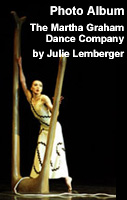|
Brought to
you by

the New
York manufacturer of fine dance apparel for women and girls. Click
here to see a sample of our products and a list of web sites
for purchasing.
With Body Wrappers it's always performance
at its best.
Go back to Flash Reviews
Go
Home
Flash Review 1, 4-27: The Voyeur
Menage a Trois a la Maguy Marin
By Paul Ben-Itzak
Copyright 2001 The Dance Insider
In the square where I lived in the
13th Arr. of Paris last fall, I couldn't help but be fascinated by the lives across
the way, or at least what I could see of them. There was the single woman to the
left and above whose veranda I knew by the clothes-drying racks, at a distance
which made her but a silhouette whose face was left to my imagination; the young
newlywed couple directly across the way; and what I grew to call the menage a
trois across the way and one floor below. The single woman and I made direct contact
one night, staring each other out in intrigued curiosity; it was intimately daring
and safely anonymous at the same time. The couple across the way, well, as soon
as he realized there was a man staying where they'd been used to seeing a woman,
the shutters closed. But as for the trio -- a woman and two men -- I was invisible
to them, they being as oblivious to me as performers can seem to be to their audience.
She danced a lot; they entertained a lot; the bedroom seemed to be the province
of one of the men, who I noticed stretchingly taking off his shirt one night;
she seemed to retire in the living room; and I'm not sure where the other man
slept, altho it may have been in the bedroom of the first. She seemed the maven
of the living room, often lounging on the sofa; the first up in the morning, opening
the window and leaning over the planter box on the veranda. And, dancing. I missed
them when, suddenly, all three disappeared for a week, the static slightly opened
window being the sign that they had not returned. Then, towards my last week in
Paris, she returned, but seemingly alone. It was a strange way to observe a daily
life of three people, because I could only guess at what they said, and I only
saw what went on near the windows, although they generously never fully drew the
scarlet curtain.
Seeing Maguy Marin's "Pour ainsi
dire" at the New Victory last night, which work also focuses on a menage a trois
of one woman and two men, and whose planter boxes at the downstage indicate the
vantage point is also the front rooms of a living space, is like having the action
of my three friends physically extenuated, plus bugged for sound. Except that
even that sound is only a hint, really, of the text going on between these roommates;
the mystery of their lives is, if anything, deepened by the non-sequitors, the
sudden epigrams: a woman, Laura Frigato, announces she is more interested in finding
herself than God; later, frantically rummaging through her purse, she amends that
at the moment she is not trying to find God, but her keys. Still later, she climbs
aboard Alessandro Sabatini's shoulders and looks over the fence delineated by
a flat upstage, and starts gushing in Italian; Sabatini translates to Laurent
Frick that she is saying she can see Italy from her perch; then that she has spotted
her mother, her father, many cousins, and finally, a parcel. That parcel, after
the three plop down to open it, turns out to contain a tambourine and a toy trumpet
-- shades of Marin's earlier "Waterzooi," in which the dancers organize an entire
toy instrument orchestra -- and, voila!, a long tube of spaghetti and a bottle
of pale grappa at whose discovery they exclaim in delight ("Ah! Grappa!"), and
which each of the three joyously swig. You can almost taste it with them. It's
an impromptu indoor picnic and concert!
The goodie box is just one of the
many boxes and doors which act as portals on Marin's stage, of various shapes
and various materials (my favorite: a curtain of golden hippie beads like the
one that guarded our San Francisco bathroom growing up) intimating that this intimate
mis-en-scene has a larger context: I counted at least three idiosyncratically-shaped
doors at one point, plus a couple of hand-sized paintings, one of which is meticulously
scrubbed and scrubbed by Frick, as if he is seeking a detail he knows is there;
and a larger canvas of a wharf, perhaps on the Seine but more resembling a Cherbourg,
in the wideness of its bay; boxes even punctuate the drama as picture frames,
illuminated by bulbs arrayed around the frame, containing the faces of all three,
in turn commented upon by another.
Like my anonymous neighbor, the woman
seems to do a lot of the cleaning up and physical and verbal gesticulating. There
are lots of keystone cops chase sequences. Many exhausted pile-ups, ending in
one that, in its utter convicted joy, can only be described as an orgastic (orgiastic?)
ah! (At least, that's what I was moved to write down at the time.) There is a
poignant and powerful kiss at one passage, Frigato planting it longly on Sabatini,
but it comes as he is sputteringly asking for some sort of favor, so the sense
is as much that she is trying to shut him up as stir him up; when she leaves,
Sabatini starts in on Frick, who quickly exits through the rear of the cabinet.
A repeated pensive moment I loved has each of the three reading his/her own book,
whispering the words aloud; rubbing elbows as they read, they are together but
alone (alone but together?).
I can't presume to apprehend any
Marin piece after one viewing. (For her own view, see her Flash
Preview of yesterday.) All I can do is try to give a general sense, first,
of the overall spirit, which here is one of children playing. Second, based on
my viewings of Marin's earlier "Waterzooi," "May B," and "Ram Dam," I can suggest
that the step Marin has taken with "Pour ainsi dire" is an unusually brave one.
It's not that Marin has chosen to take on much more than before, but the opposite.
Where "Waterzooi" and "May B" were indeed rich, dense stews, this work is a salad
-- pungently spiced, to be sure, but sparingly. In Philippe Decouffle, seen Wednesday
at the Brooklyn Academy of Music, we have a choreographer so in love with his
ability to entertain with special effects that the dance seems like a poorly cultivated
after-thought. And we have a work that is obviously, cloyingly attempting to appeal
to us as awkwardly cute. In Marin, we have a work that is oh-so-naturally endearing
in the crazy, madcap tussling about of its naturally engaging and sympathetic
performers (given good juice by Denis Mariotte's keystone-ey score, and winningly
set-off by Christian Toullec's bright pastel sets and simple lighting scheme,
and the simple civilian elegance of Candice Zastera's costumes); and an artist
who can sensationally entertain and blow you away with her tools, easily adding
theatricality and oomph to her work, but who chooses this time to throw it all
out and start all over again with three performers and an idea.
While Decouffle may be ambitious,
it's Marin who is courageous.
Compagnie Maguy Marin continues at
the New Victory through Sunday. For showtimes and ticket info, please visit the
New Victory web site.
Go
back to Flash Reviews
Go Home
|






